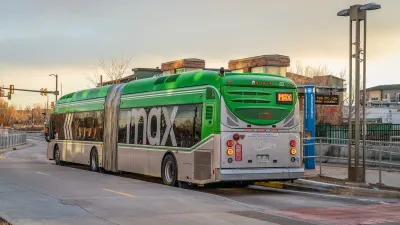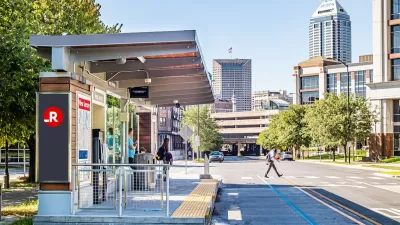Funding seems locked for a planned streetcar line in Detroit, but some locals argue that what the metro region really needs is a wider-reaching bus rapid transit system. The Transport Politic profiles the proposals.
The three-line BRT proposal has been dubbed the "Golden Triangle" and would spread far beyond the borders of the city. The streetcar line will cover just 9 route miles, all within Detroit.
"Politicians and businesspeople from Macomb and Oakland Counties, representing a large section of the region's population, have been quick to point out the limitations in the Woodward Streetcar line: at a total cost of $425 million, it will cover only nine route miles, all within the city of Detroit. For about twice that cost, advocates of a "Golden Triangle" bus system argue that they could build a 67-mile network of lane-separated lines along Woodward Avenue, Gratiot Avenue, and M-59, connecting downtown Detroit with Pontiac and Clinton.
In theory, this program of investments would encourage increasing transit ridership in the region, a first step before making much larger investments in rail.
And it is true that far more people will be within commuting distance of the three-line bus system than would be close to even the longer light rail line; Detroit's residential density is relatively evenly distributed throughout the city, not concentrated in the core (parts of which the mayor has recently announced plans to transform into farmland). Meanwhile, the fact that downtown remains a significant jobs center means that getting commuters in from across the region is an important step. "
FULL STORY: For Detroit, BRT or Rail First?

Maui's Vacation Rental Debate Turns Ugly
Verbal attacks, misinformation campaigns and fistfights plague a high-stakes debate to convert thousands of vacation rentals into long-term housing.

Planetizen Federal Action Tracker
A weekly monitor of how Trump’s orders and actions are impacting planners and planning in America.

In Urban Planning, AI Prompting Could be the New Design Thinking
Creativity has long been key to great urban design. What if we see AI as our new creative partner?

King County Supportive Housing Program Offers Hope for Unhoused Residents
The county is taking a ‘Housing First’ approach that prioritizes getting people into housing, then offering wraparound supportive services.

Researchers Use AI to Get Clearer Picture of US Housing
Analysts are using artificial intelligence to supercharge their research by allowing them to comb through data faster. Though these AI tools can be error prone, they save time and housing researchers are optimistic about the future.

Making Shared Micromobility More Inclusive
Cities and shared mobility system operators can do more to include people with disabilities in planning and operations, per a new report.
Urban Design for Planners 1: Software Tools
This six-course series explores essential urban design concepts using open source software and equips planners with the tools they need to participate fully in the urban design process.
Planning for Universal Design
Learn the tools for implementing Universal Design in planning regulations.
planning NEXT
Appalachian Highlands Housing Partners
Mpact (founded as Rail~Volution)
City of Camden Redevelopment Agency
City of Astoria
City of Portland
City of Laramie





























